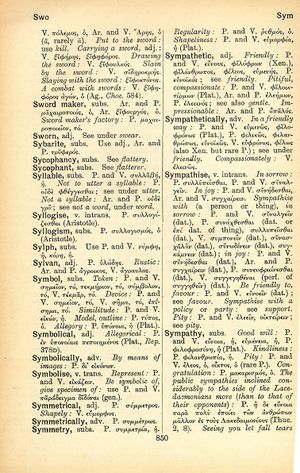sycophancy: Difference between revisions
Ζῆν οὐκ ἔδει γυναῖκα κατὰ πολλοὺς τρόπους → Nullam esse decuit feminam multis modis → Kein Leben steht der Frau aus vielen Gründen zu
mNo edit summary |
mNo edit summary |
||
| Line 3: | Line 3: | ||
===substantive=== | ===substantive=== | ||
[[ | See [[flattery]], [[συκοφαντία]]. | ||
}} | }} | ||
==Wikipedia EN== | ==Wikipedia EN== | ||
In modern English, sycophant denotes an "insincere flatterer" and is used to refer to someone practicing sycophancy (i.e. insincere flattery to gain advantage). The word has its origin in the legal system of Classical Athens. Most legal cases of the time were brought by private litigants as there was no police force and only a limited number of officially appointed public prosecutors. By the fifth century BCE this practice had given rise to abuse by "sycophants": litigants who brought unjustified prosecutions. The word retains the same meaning ("slanderer") in Modern Greek and French (where it also can mean "informer"). In modern English, the meaning of the word has shifted to its present usage. | In modern English, sycophant denotes an "insincere flatterer" and is used to refer to someone practicing sycophancy (i.e. insincere flattery to gain advantage). The word has its origin in the legal system of Classical Athens. Most legal cases of the time were brought by private litigants as there was no police force and only a limited number of officially appointed public prosecutors. By the fifth century BCE this practice had given rise to abuse by "sycophants": litigants who brought unjustified prosecutions. The word retains the same meaning ("slanderer") in Modern Greek and French (where it also can mean "informer"). In modern English, the meaning of the word has shifted to its present usage. | ||
Revision as of 10:45, 6 December 2020
English > Greek (Woodhouse)
substantive
See flattery, συκοφαντία.
Wikipedia EN
In modern English, sycophant denotes an "insincere flatterer" and is used to refer to someone practicing sycophancy (i.e. insincere flattery to gain advantage). The word has its origin in the legal system of Classical Athens. Most legal cases of the time were brought by private litigants as there was no police force and only a limited number of officially appointed public prosecutors. By the fifth century BCE this practice had given rise to abuse by "sycophants": litigants who brought unjustified prosecutions. The word retains the same meaning ("slanderer") in Modern Greek and French (where it also can mean "informer"). In modern English, the meaning of the word has shifted to its present usage.

